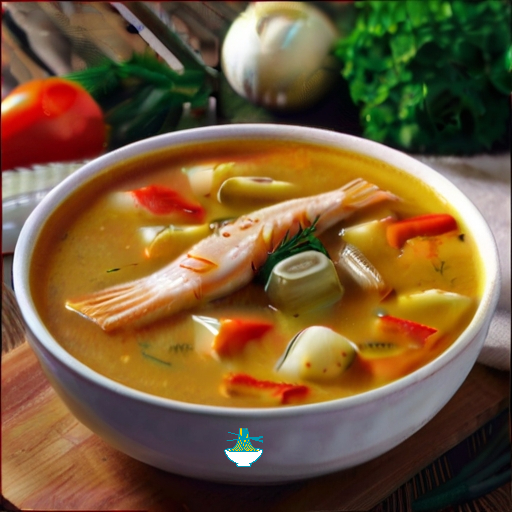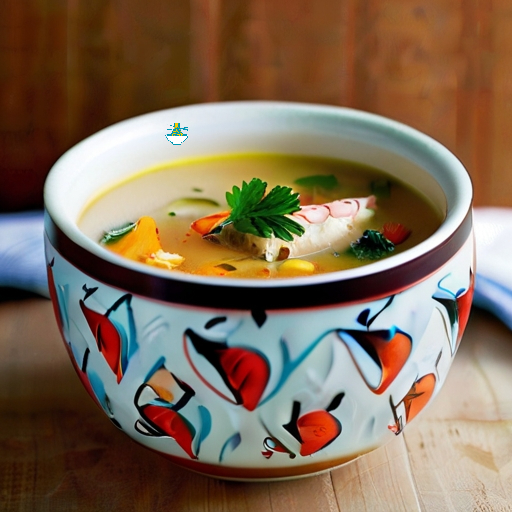Indulge in the authentic flavors of the North Atlantic with our Faroe Islands Fish Soup. Crafted with care and tradition, this hearty soup is a culinary masterpiece that transports you to the rugged shores of the Faroe Islands. Bursting with the freshest catch from the icy waters, including succulent pieces of cod, salmon, and haddock, each spoonful offers a symphony of flavors. Infused with aromatic herbs, root vegetables, and a touch of cream, our soup is a harmonious blend of warmth and comfort. Whether you're savoring it as a starter or making it the star of your meal, our Faroe Islands Fish Soup promises an unforgettable dining experience that celebrates the rich maritime heritage of the North Atlantic.

Ingredients:
- 500g mixed fish fillets (such as cod, salmon, haddock), cut into bite-sized pieces
- 1 onion, finely chopped
- 2 carrots, diced
- 2 celery stalks, diced
- 2 potatoes, peeled and diced
- 2 garlic cloves, minced
- 1 leek, sliced
- 1 bay leaf
- 1 teaspoon thyme
- 1 teaspoon dill (fresh or dried)
- 4 cups fish or vegetable broth
- 1 cup heavy cream (optional)
- Salt and pepper to taste
- Fresh parsley, chopped (for garnish)
- Butter or oil for sautéing

Instructions:
1- In a large pot, heat some butter or oil over medium heat. Add the chopped onion, carrots, celery, potatoes, garlic, and leek. Sauté for about 5 minutes until the vegetables start to soften.
2- Add the mixed fish pieces to the pot and continue cooking for another 3-4 minutes, stirring gently to avoid breaking up the fish too much.
3- Pour in the fish or vegetable broth, and add the bay leaf, thyme, and dill to the pot. Season with salt and pepper to taste.
4- Bring the soup to a gentle simmer and let it cook for about 15-20 minutes, or until the vegetables are tender and the fish is cooked through.
5- If using heavy cream, stir it into the soup during the last few minutes of cooking, allowing it to heat through without boiling.
6- Once the soup is ready, taste and adjust seasoning if needed. Remove the bay leaf.
7- Serve the Faroe Islands Fish Soup hot, garnished with fresh chopped parsley.
Enjoy your hearty and comforting Faroe Islands Fish Soup, a delicious blend of various fish, vegetables, and creamy goodness!
Nutritional Values:
Mixed Fish Fillets (500g):
- Calories: 650 kcal
- Protein: 110g
- Fat: 15g
- Carbohydrates: 0g
- Fiber: 0g
benefits
- High in protein, essential for muscle growth and repair.
- Rich in omega-3 fatty acids, which are beneficial for heart health and brain function.
Onion (1 medium):
- Calories: 44 kcal
- Protein: 1g
- Fat: 0g
- Carbohydrates: 10g
- Fiber: 2g
benefits
- Contains antioxidants that help reduce inflammation and lower the risk of chronic diseases.
- Good source of vitamin C and fiber, which support immune function and digestive health.
Carrots (2 medium):
- Calories: 50 kcal
- Protein: 1g
- Fat: 0g
- Carbohydrates: 12g
- Fiber: 4g
benefits
- Excellent source of beta-carotene, which is converted into vitamin A in the body and important for vision and immune health.
- High in antioxidants, including carotenoids, which may protect against certain cancers and promote skin health
Celery (2 stalks):
- Calories: 15 kcal
- Protein: 1g
- Fat: 0g
- Carbohydrates: 3g
- Fiber: 2g
benefits
- Low in calories and rich in water, making it hydrating and beneficial for weight management.
- Contains fiber, vitamins, and minerals, such as vitamin K and potassium, which support bone health and regulate blood pressure.
Potatoes (2 medium):
- Calories: 220 kcal
- Protein: 5g
- Fat: 0g
- Carbohydrates: 50g
- Fiber: 6g
benefits
- Good source of complex carbohydrates, providing energy for physical activity and brain function.
- Contains vitamin C, potassium, and B vitamins, which are essential for overall health and vitality.
Garlic (2 cloves):
- Calories: 10 kcal
- Protein: 0g
- Fat: 0g
- Carbohydrates: 2g
- Fiber: 0g
benefits
- Has antimicrobial properties that may help fight infections and support immune function.
- Contains compounds like allicin, which may lower blood pressure and cholesterol levels.
Leek (1 medium):
- Calories: 54 kcal
- Protein: 2g
- Fat: 0g
- Carbohydrates: 13g
- Fiber: 2g
benefits
- Rich in vitamins A and K, which are important for vision, bone health, and blood clotting.
- Contains flavonoids and antioxidants that may have anti-inflammatory and anti-cancer effects.
Fish or Vegetable Broth (4 cups):
- Nutritional values can vary depending on the brand and preparation method. Typically low in calories and fat, and high in sodium.
benefits
- Provides hydration and electrolytes, important for maintaining fluid balance and supporting nerve function.
- Contains nutrients extracted from vegetables or fish bones, such as vitamins, minerals, and amino acids.
Heavy Cream (1 cup):
- Calories: 821 kcal
- Protein: 5g
- Fat: 88g
- Carbohydrates: 7g
- Fiber: 0g
benefits
- High in calories and fat, providing energy and satiety.
- Contains vitamins A, D, E, and K, which are fat-soluble and important for various bodily functions, including vision, bone health, and blood clotting.
Please not that these values are approximate and can vary based on factors such as specific ingredients used, cooking methods, and serving sizes.


Comments